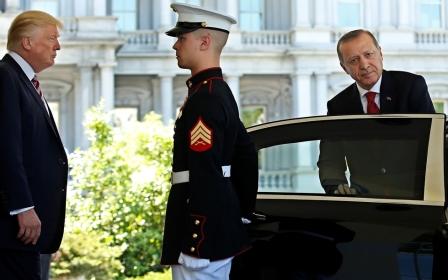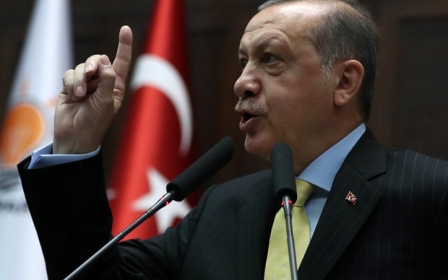Turkey's tough tactics with US and Germany will enable it to get its way

In international affairs it's not often that a country achieves two major breakthroughs in a single day. But, if things continue to go well (which is very far from certain), that may be what Ankara achieved on 15 February in soothing its previously troubled relations with both Germany and the US, its two main Western allies. For the past months, Turkey has been facing acute - though unrelated - problems with both countries.
Tension dispelled?
At one summit in Berlin, Turkey's Prime Minister Binali Yildirim and the German Chancellor Angela Merkel announced that a new period might be opening up for the two countries.
To confirm this, the following day, Turkey announced that it was releasing Deniz Yucel, the Turkey correspondent of the leading German daily Die Welt, whom it had been detaining on espionage charges for the past year and deporting him - even though he has Turkish-German dual nationality.
No explanation was given for Yucel's release, but it means that the growing storm in Germany about his detention has ended. The talks between Yildirim and Merkel were the culmination of a series of top-level secret meetings between the two governments which thrashed out some kind of deal, despite earlier Turkish government warnings that Turkey's courts are outside politics.
Almost simultaneously, a few hours after the Berlin summit, Turkey's relations with the US took an unexpected upwards turn during a three-and-a-half-hour meeting in the Turkish capital, Ankara, between President Recep Tayyip Erdogan and the US Secretary of State Rex Tillerson.
Turkey and the US, once close NATO allies in the Cold War, began their meeting at loggerheads on a range of issues. There are several of these but the most urgent was an approaching collision between Turkey's armed forces engaged in attacking Syrian Kurdish militants of the YPG in Afrin province, and US military personnel at Manbij, a town 60 miles east, who see the YPG as allies against Islamic State (IS) group.
The US wants Turkey to remain inside the framework of NATO and not drift into an alternative partnership with Russia
Tillerson went into the meeting without any State Department aides or translators, allowing Mevlut Cavusoglu, Turkey's foreign minister, to do all the translation for him, a total break with normal diplomatic practice.
Commenting on the move recently, a retired former State Department spokesperson told CNN it was "foolhardy in the extreme" since the US has no way of challenging any disputes that could arise later over what promises were made.
However, Erdogan and Tillerson emerged from the meeting with the tension dispelled. They reaffirmed the need for the US and Turkey to work together and promised to set up mechanisms to take their dialogue further – though there is as yet no indication of what these can be. A further round of discussion, this time presumably much more detailed, is promised in mid-March.
A long list
That said, it is still virtually impossible to see what the bones of a lasting deal in Syria, satisfactory to both Turkey and the US, will be. The most obvious possibility is that the US will somehow persuade its Syrian Kurdish allies to withdraw to the east bank of the Euphrates river.
But will they agree to do this? Even if they do, would this gesture be sufficient for Turkey, which regards the autonomous Syrian Kurdish enclaves as unacceptable and an existential threat to its future and territorial integrity?
On top of that there is a fairly long agenda of other issues that must be resolved between Turkey and the US before relations can be normalised. These include the fate of three State Department local employees facing trial in Turkey, a long jail sentence on a Turkish-American NASA engineer, and the detaining of an American Protestant pastor.
Above all, the future of Fethullah Gulen, the exiled Sufi cleric whom President Erdogan - and most Turks - believe was behind the abortive coup attempt of July 2016, but whom the Americans refuse to take measures against.
Until such time as at least some of the US prisoners in Turkey are set free, it is hard to envisage a full-scale recovery in bilateral relations.
Ankara's pressure on the US remains and, if Tillerson wants to revive relations, he will have to come up with more concessions
The biggest question however is whether the Syrian Kurdish YPG and the US will remain close allies. But that will only be the case as long as the YPG remain on bad terms with the Syrian President, Bashar al-Assad, whom the US still wants to depose.
Rumours that Assad’s forces were starting to help the YPG in Afrin against Turkey seem now to be true - with Turkey launching strikes against pro-Assad militia entering Afrin on Tuesday. To forestall such a deal some observers in Turkey believe that the time has come for Ankara to reach a deal with Assad in order to block this, but as yet President Erdogan appears resolved not to take this route.
From the point of view of both Germany and the US, last week's talks nevertheless demonstrated that Erdogan's administration recognises the need to avoid a complete breach in its relations with the two countries.
Tough tactics
Given its commercial and strategic interests, it is hard to see how Turkey could have done otherwise. But the malleable response of both the Western powers suggests that Turkey's present tough tactics will generally enable it to get its way, a contrast with decades during which Turkey had little or no international bargaining power.
The US wants Turkey to remain inside the framework of NATO and not drift into an alternative partnership with Russia. Germany, possibly with an eye on potential unrest among its own Turkish immigrant population, will probably deflect the fiercest of Turkey's critics elsewhere in the EU.
Perhaps Germany will help ensure that Turkey gets an improved trade deal with the European Union at the Turkey-EU Summit due to be held the end of March, though it may not get the visa-free travel inside the union which Ankara is now also demanding.
This assumes of course that tempers will not flare again or new short-term disputes arise. Ominously for Washington, President Erdogan declared in on Monday that "Holding negotiations is surely valuable but we are most interested in results. Our main interest is in implementing the agreements and developments in the field…the ones who need to correct their mistakes and to pull themselves together are our [US] counterpart."
Ankara's pressure on the US remains and if Tillerson wants to revive relations, he will have to come up with more concessions.
- David Barchard has worked in Turkey as a journalist, consultant and university teacher. He writes regularly on Turkish society, politics and history, and is currently finishing a book on the Ottoman Empire in the 19th century.
The views expressed in this article belong to the author and do not necessarily reflect the editorial policy of Middle East Eye.
Photo: Turkish President Recep Tayyip Erdogan and German Chancellor Angela Merkelshake hands at the G20 leaders summit in Hamburg, Germany on 7 July 7 2017 (REUTERS)
This article is available in French on Middle East Eye French edition.
Stay informed with MEE's newsletters
Sign up to get the latest alerts, insights and analysis, starting with Turkey Unpacked
Middle East Eye delivers independent and unrivalled coverage and analysis of the Middle East, North Africa and beyond. To learn more about republishing this content and the associated fees, please fill out this form. More about MEE can be found here.






